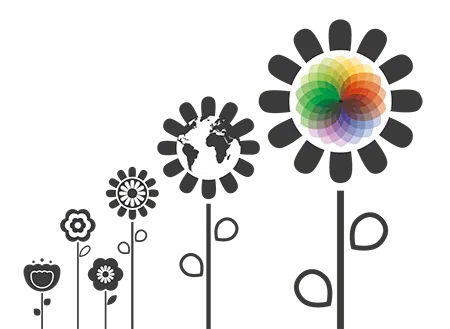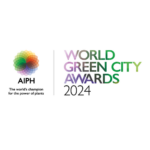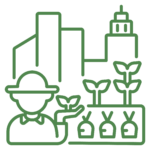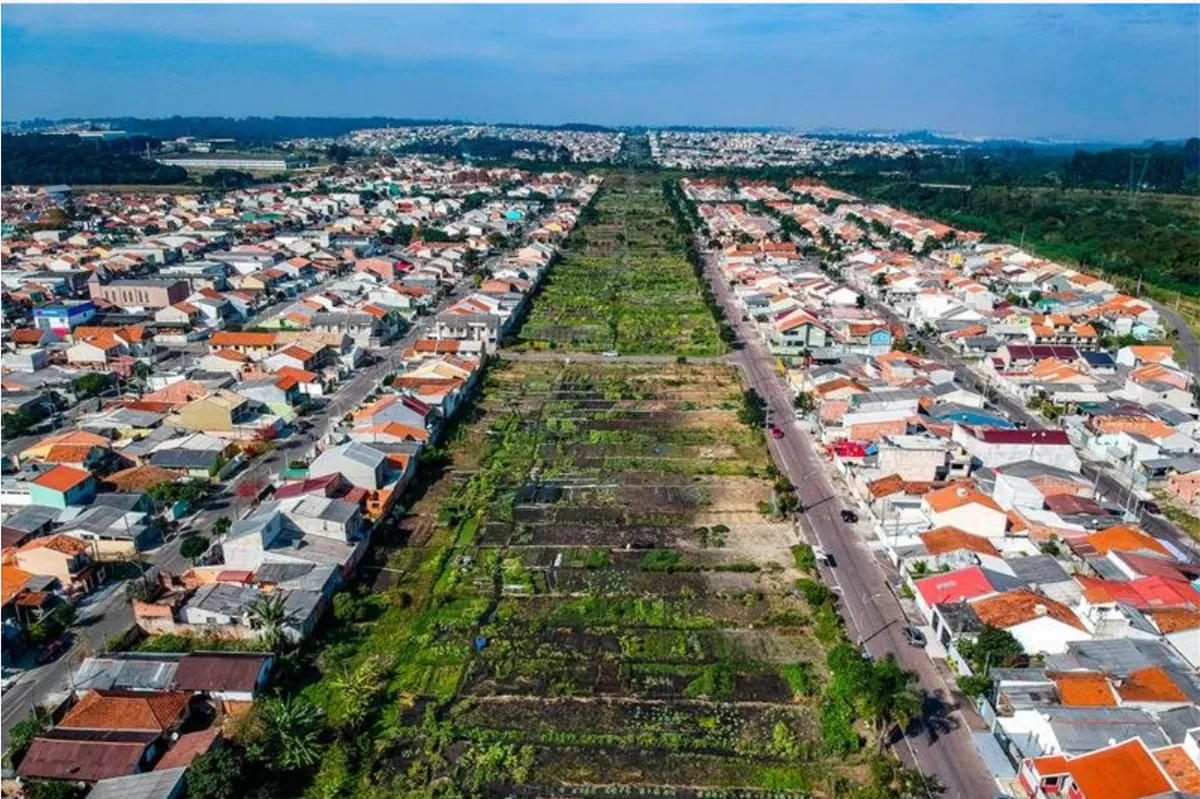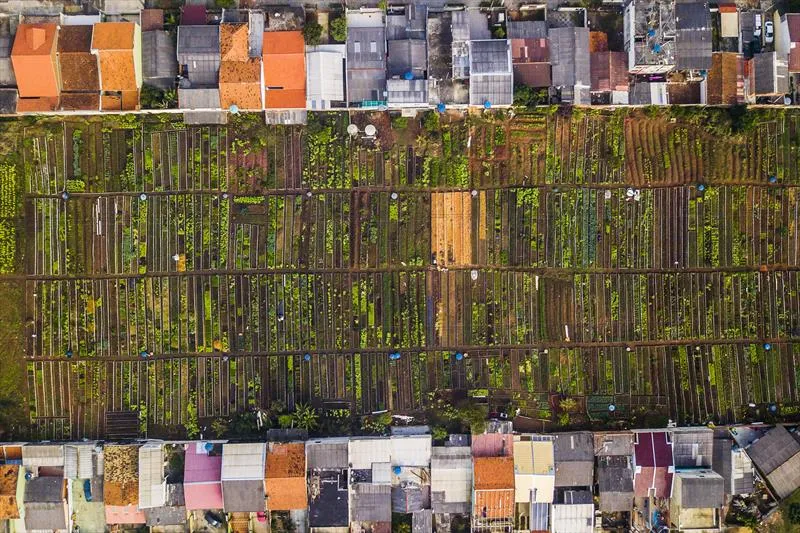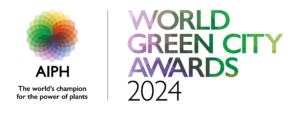Benefits of Urban Greening
Harnessing the Power of Plants
Considering that Curitiba’s Urban Agriculture Programme focuses on edible plants, the benefits and potential are evident. In an increasingly urbanised and connected society, Urban Agriculture emerges as a vital tool for reconnecting people with nature and the food cycle. In urban gardens, urban farms and honey gardens, awareness of the benefits of urban green spaces is experienced by the visitors and is replicated within their families and social circles. These initiatives bring numerous benefits related to biodiversity, local microclimates, community empowerment and environmental education. These benefits are particularly positive for nations and municipalities more vulnerable to the urbanisation process and suffering with climate change, where a well-established and continually innovative Urban Agriculture Programme like Curitiba’s seeks to bolster urban resilience against environmental and social impacts while promoting food sovereignty. In this regard, the municipality has prioritised and significantly expanded urban agriculture efforts, including the establishment of new gardens, the placement of native bee hives throughout the city, and the creation of two urban farms, unique spaces in Brazil that are part of a public agenda aimed at constructing a sustainable urban ecosystem.
Delivering Multiple Benefits
The implementation of urban gardens is carried out in three different formats: community gardens, school gardens and institutional gardens, where the potential of plants and associated ecosystems is harnessed to improve food quality, social interaction and the promotion of agroecological agriculture. Specifically, in community gardens where production is on a larger scale, there is an impact on household income due to reduced food costs and the possibility of selling surplus production. The areas where community gardens are established undergo a process of regeneration, reducing urban environmental degradation. In school and institutional gardens, as well as in the Urban Farm, the potential of plants is utilised for learning about the food cycle, serving as a tool for nutritional and environmental education.
The Urban Agriculture Programme is part of an integrated food agenda administered by the Municipal Secretariat for Food and Nutritional Security, responsible for coordinating with other public agencies and civil society to ensure intersectoral collaboration and programme advancement. The planning of actions is conducted in collaboration with the population to develop the Municipal Food and Nutritional Security Plan, which has a quadrennial duration. In the legislative branch, the urban agriculture agenda is represented by the Parliamentary Front for Food and Nutritional Security, which monitors, collaborates and oversees projects and programmes aimed at promoting and supporting food and nutritional security, including the Curitiba Food Supply Fund, used to financially develop or support the Urban Agriculture Programme.
The City’s Bold and Innovative Vision
The Urban Agriculture Programme of Curitiba unites many initiatives that work together to build a sustainable urban ecosystem. Community gardens innovate by forming partnerships with the third sector (Energy distribution company – COPPEL) to occupy urban voids, such as the areas beneath high-tension power lines, bringing agriculture into the city as an alternative income source for local families.
Encourages regenerative agriculture to restore riparian forests along rivers and rehabilitate the Environmental Protection Areas (APA). Fruit and native trees are planted in degraded areas once used for waste and debris dumping.
School vegetable gardens are used as a learning tool for curriculum subjects like mathematics and science due to their metric nature. The basics of plant physiology and nutritional value can be taught in a practical way.
The placement of stingless native bee hives in the city’s urban gardens, as part of the Honey Gardens Project, which contributes to pollination in the city, is a bold initiative aimed at forming a pollinator corridor in the city. The idea is to maintain all the green areas within a 500-metre distance from the stingless bee hives.
Curitiba’s Urban Farm, inaugurated in 2020, represents the first location in Brazil dedicated to education of sustainable agricultural practices in the middle of a city. It offers courses and workshops in both online and presential formats, on a wide range of food security topics, such as basic agricultural techniques, organic certification compliance, domestic composting, potted orchard course, small-space gardens and management of stingless bees.
Partnerships and Collaboration
Curitiba’s Urban Farm hosts two startup companies within its physical space because of a partnership between the Municipal Secretariat for Food and Nutritional Security (SMSAN) and the Curitiba Agency for Development and Innovation. This collaboration is centred on developing innovative projects and solutions in the fields of agricultural production, food security, organic waste disposal and the optimisation of renewable resources. In this context, the Urban Farm works as a laboratory for the subsequent transfer of these experiences to communities.
The objective of the projects is to enhance food production, promote responsible water usage, reduce costs, and raise awareness within the community regarding food waste and mindful consumption. The startup “Coletivo Ambiente Livre” which is responsible for the “Compostroca Project,” deals with reverse logistics of organic waste generated by community families, converting these waste materials into fertiliser for community vegetable gardens. The startup “IrriGate” develops automation systems for irrigation in greenhouses.
The Smart City World Congress event identified Curitiba’s urban agriculture initiatives as an innovative solution for transforming urban environments into efficient, secure and sustainable spaces.
The partnership between the Municipal Secretariat for Food and Nutritional Security and the Municipal Education Secretariat drives educational initiatives through the “Linhas do Conhecimento” (Lines of Knowledge) Programme, focusing on socio-environmental sustainability. The goal is to raise awareness among students and teachers about the importance of healthy eating and cultivating food in urban gardens.
Addressing Urban Challenges
The Issue
Food insecurity and rapid urbanisation are challenges faced by metropolises worldwide, especially in peripheral areas. Even in cities like Curitiba, where the human development index is considered high compared to other Brazilian municipalities, the coexistence of malnutrition and obesity rates in the population reflects the urgency of actions that can structurally improve food quality and the socio-economic situation of society. In this context, the Urban Agriculture Programme, which involves on-site implementation of vegetable gardens and the centralisation of policies at the Urban Farm, encourages and empowers people to produce their own food, especially fruits and vegetables, without the use of pesticides, thereby improving food quality and overall health. It also demonstrates the potential of green jobs within cities, as well as the possibility of shortening the consumption chain and the resulting environmental benefits, such as reduced greenhouse gas emissions and environmental regeneration.
The Impact of the Issue
When envisioning the future of these spaces if they were not occupied by urban agriculture, they could certainly become dumping grounds or areas of disorderly occupation with illegal constructions and without basic municipal services such as water supply and sewage collection. This scenario would lead to serious health, environmental, and social problems that such areas face, including the spread of communicable diseases and soil pollution, with a significant negative impact on the community’s quality of life.
Climate change poses a significant threat to food production worldwide. The occurrence of extreme weather events, such as droughts, floods and hurricanes, can result in substantial disruptions to the food supply chain. These disruptions, in turn, can lead to widespread food shortages and price spikes, affecting vulnerable populations the hardest.
Moreover, access to food, even when it is available in abundance and can be transported across regions, can be severely constrained in countries with substantial income disparities, such as Brazil. Socioeconomic inequalities often mean that many individuals and communities struggle to afford nutritious food, leading to food insecurity and malnutrition issues.
A Nature Orientated Future
In this challenging context, it is clear that merely increasing the production of food is not sufficient to address the complex issues of food security and equitable access. To ensure that all citizens have access to healthy and affordable food, it is crucial to promote decentralised food production systems within urban areas. These systems, characterised by short supply chains, not only reduce the environmental impact of food transportation but also create opportunities for local employment and economic development.
By encouraging urban agriculture, supporting community gardens and facilitating access to fresh produce within cities, we can help mitigate the impact of climate change on food security while addressing income inequality and fostering resilient and sustainable food systems. This approach represents a practical and viable solution to the interconnected challenges of climate change, food access and social equity.
Nature Positive Solutions
Implementation
Curitiba’s Urban Agriculture Programme traces its origins back to the mid-1990s, making it not a recent initiative but an ongoing, evolving endeavour. Its implementation has been gradual and consistent, garnering support from different municipal administrations and seamlessly integrating into the city’s sustainability plan.
This programme encourages the utilisation of vacant and unproductive urban areas, transforming them into productive vegetable gardens. In these spaces, food is cultivated, organic waste is recycled, and, most importantly, people come together around the theme of food production. The rate of increase in green areas with implemented gardens is 7,890 square metres per year.
The Curitiba Urban Farm, established in 2020, serves as the central hub for all training in urban agriculture, sustainability and innovation. Its success is evident, with a similar unit set to open in 2024, underscoring the community’s endorsement of this initiative.
Over the past five years, 43,968 square metres of gardens have been established, equivalent to 4.4 hectares. Notably, the majority of these spaces are small, approximately 30 square metres each, having a smaller environmental footprint but exerting a substantial educational influence, particularly in school settings.
The issue of food insecurity remains a pressing concern, especially in peripheral areas. Within this context, the Urban Agriculture Programme, encompassing on-site garden implementation and policy centralisation at the Urban Farm, actively encourages and empowers individuals to take charge of their food production. This initiative also highlights the significant potential for creating green jobs within urban environments, fostering a more sustainable and resilient city.
Feasibility
The urban agriculture Programme of Curitiba was established by law (https://shorturl.at/dwFS9), therefore it is not susceptible to changes in administration.
The physical structure of the Urban Farm is already consolidated and does not depend on significant additional financial contributions, only maintenance of the spaces. The courses offered at the Urban Farm are conducted by administration employees with stable careers, ensuring continuity. The Urban Farm was established by law, having a creation decree, which guarantees its continuity and survival through changes in government (https://shorturl.at/dDFZ9).
The financial capital for the promotion of the Urban Agriculture Programme is guaranteed by a public fund (FAAC) established by law in 1990 (https://shorturl.at/eqM37). This fund is currently undergoing restructuring, with its budget set to be doubled (https://shorturl.at/lAHN8).
Proof of this will be the construction of a new urban farm in 2023-2024, with both project and budget approved (https://shorturl.at/cmLO0).
Resources for the maintenance of existing vegetable gardens and the creation of new gardens are secured by the FAAC fund. Inputs such as fertile soil, organic fertiliser, construction materials for the gardens, seedlings, seeds, containers for water storage, composting containers, stingless bee hives and fruit tree seedlings are guaranteed. For example, approximately 240 tons of fertile soil, 61 tons of fertiliser, 530 construction blocks for beds and 436,100 vegetable seedlings are distributed annually.
Multi-Stakeholder Support
The Urban Agriculture Programme of Curitiba not only encourages partnerships but also relies on them. The largest urban gardens in Curitiba are located under the high-voltage power lines that cross the city. By law, no construction of any kind or any commercial activity is allowed in these locations. It was only through a partnership with the energy distribution company that it became possible to use these spaces.
An inherent feature of this initiative is community participation. The gardens are only established if the community is involved. Currently, 325 families benefit from and maintain these spaces, making community involvement the foundation of Curitiba’s Urban Agriculture Programme.
On the other hand, at the Urban Farm, the qualified physical space attracts many partners from different sectors of society, such as private companies, public enterprises and NGOs. These partners provide valuable contributions of human capital to spread the key concepts in the Urban Farm initiative and the Urban Agriculture Programme.
Examples of public sector partners:
- Paraná State Water and Sewage Company (SANEPAR) – https://site.sanepar.com.br/ – are replicating the model of stingless bee management that is part of the Urban Agriculture Programme in more than 300 public schools in the city of Curitiba.
- Paraná Rural Development Institute (IDR) – https://www.idrparana.pr.gov.br/ – uses the infrastructure and visibility of the Urban Farm for the dissemination of knowledge related to peri-urban agriculture development in the metropolitan region of the city.
Management and Maintenance
The Urban Agriculture Programme is based on providing space, infrastructure, inputs and technical assistance to participating families and communities. The project’s aim is a gradual management of the process by these communities. Therefore, after approximately one-year, urban gardens are already entirely managed by the community, with the public administration providing less intensive and primarily corrective assistance. In contrast, the Urban Farm is managed by civil servants with stable careers, and it is a public facility established in its physical structure and integrated within the city’s innovation circuit. The Urban Farm is a mandatory stop for delegations of managers, entrepreneurs and sustainability organisations from around the world.
The main barriers preventing the development of urban agriculture are: a) the regularisation of urban areas to implement vegetable gardens and b) changes in public administration priorities that may shift away from the urban agriculture focus. These two barriers have been addressed with the creation of the Urban Agriculture Law (https://shorturl.at/dwFS9), the law establishing the Urban Farms Programme (https://shorturl.at/dDFZ9), and the law establishing the Food Security Fund – FAAC (https://shorturl.at/eqM37), which ensures funding for initiatives. Consequently, the Urban Agriculture Programme is legally established with support from the city’s urban planning sector, through urban zoning that permits agricultural activities within the city. The Programme is also financially consolidated, with a specific support fund for its development.
Measuring and Reporting Impact
Monitoring Results
The Urban Agriculture Programme, concerning its main activity of implementing vegetable gardens, monitors the following variables: 1) Number of people directly affected. These are the people who plant and harvest the garden’s products, consuming them and selling any surplus within the community. 2) Number of people indirectly affected. These are individuals related to the families taking care of the gardens, such as neighbours, relatives and visitors who enjoy the space. 3) Tons of food produced. 4) Area of gardens implemented per year.
In the Urban Farm, the following are monitored: 1) Total number of visitors; 2) Number of visitors participating in guided tours; 3) Number of visitors attending courses related to sustainable food production; 4) Total number of courses conducted; 5) Number of courses conducted by partners; 6) Tons of food produced and donated to the food bank in the city of Curitiba.
The expected outcome, with a nature-positive focus, is: 1) Reduction of degraded areas within the urban centre. Areas that are not converted into gardens are often frequented by drug users, serve as garbage dumps and accumulate disease-transmitting animals. When converted into gardens, these areas cease to be a social and environmental problem and, at the same time, become a food production site, strengthening short supply chains. 2) Through the courses offered at the Urban Farm, awareness is raised, especially among children; to date, more than 1,751 children have participated in guided tours.
Demonstrating Progress
Monitoring is essential because there is an investment of public resources, and accountability is necessary. The growth and expansion rate of the Urban Agriculture Programme, on the other hand, highlights both its strengths and weaknesses in the strategy. For instance, the number of vegetable gardens established in schools in 2023 compared to 2022 was very low due to: a) school gardens being small with a lower impact on the “implemented area” variable; b) schools being far apart, resulting in a significant loss of time for their maintenance; c) the small size of the team involved in implementation. Based on these facts, the strategy was changed, opting for much less frequent monitoring of school vegetable gardens, with fewer visits and reduced training hours. Instead, the focus shifted to training teachers at the Urban Farm to empower them as knowledge multipliers. In this new format, it becomes possible to serve a much larger number of schools.
Measuring progress and establishing clear and objective variables are key elements in the Programme’s expansion. Currently, the strategy is oriented towards partnerships with companies interested in advancing their ESG agenda. By presenting a clear strategy based on public policies and measurable data, we aim to attract companies and align them to participate in the Urban Agriculture Programme.
Measuring Impact
The numbers of the Urban Agriculture Programme are as follows:
- Total area of urban gardens: 177,000 square metres (or 17 hectares or 44 acres).
- Total number of urban gardens: 147.
- Community gardens: 47.
- Institutional gardens: 36.
- School gardens: 43.
- Estimated monthly vegetable production in community gardens: 160 tons.
- Estimated number of people benefiting from community gardens: 37,000.
- Urban Farm area: 4,435 square metres.
- Average annual number of children visiting the Urban Farm: 844.
- Average monthly number of people attending courses at the Urban Farm: 140.
- Estimated annual vegetable production at the Urban Farm: 1 ton.
- Current number of beehives (stingless bees): 89.
- Estimated number of beehives (stingless bees) to be installed in municipal schools in 2024: over 360.
The measurement of impacts is primarily quantitative, as demonstrated above, but there is also feedback at the individual level that we can observe in our day-to-day fieldwork. This feedback is more challenging to quantify, but for those working with people, the acceptance and difference that an urban vegetable garden makes in people’s lives is very clear. However, the measurement of more qualitative aspects is the next step in this initiative.
Learning and Transferability
Adaption and Enhancement
The Urban Agriculture Programme initiative originates from legitimate demands of the people. Among these demands, we can mention the need to occupy urban voids, sources of environmental and social problems; the need to produce food in difficult times, such as during the COVID-19 pandemic, or the need to educate the new generations about the importance of green spaces, with a focus on those that can still produce healthy food. The initiative adapts to the legitimate demands of the communities, varying between larger gardens with a focus on food production or smaller gardens with an emphasis on education. Partnerships with residents’ associations, various institutions, and schools define the focus of the actions, with adjustments year by year.
In this context, taking into consideration time and workforce limitations, our protocol was adapted, moving all training to the Urban Farm space, optimising time and workforce involvement. This way, it was possible to implement more gardens throughout the city.
The implementation of gardens depends to the maximum extent on the availability of areas, which can be public, private or areas where construction activity cannot take place, such as locations under high-voltage power distribution lines. At this point, the initiative relies on partnerships to secure the use of these areas, having found significant support, even from individuals who set aside real estate speculation and lend their land for up to five years.
Potential for Replication
The nearly weekly visits by members of committees from other institutions, both Brazilian and foreign, demonstrate the success of the initiative and how it inspires others to replicate it.
Inspired by the Honey Gardens of the Curitiba City Hall, the State Government created the “Poliniza Paraná” Programme (Pollinated Paraná), installing hives of native stingless bees in cities across Paraná state. The project’s goal is to reintroduce bees (some species are on the brink of extinction) into conservation units, urban parks, squares and gardens, contributing to the preservation of native species in Paraná and promoting biodiversity conservation through pollination – a process that ensures higher quality and productivity of fruits and grains. The creators believe that the project can also encourage the emergence of new private meliponaries (comercial production of honey) .
SANEPAR – the Paraná Sanitation Company – has established spaces called “Water and Honey Gardens,” inspired by the Honey Gardens of the Curitiba City Hall, thus expanding efforts to preserve native bees in the Metropolitan Region of Curitiba, by installing stingless bee hives in municipal schools and the company’s headquarters.
The DNA of the Urban Farm is knowledge transmission; therefore, education is an integral part of its underlying concept. The success of this initiative has inspired the construction of a new Urban Farm, with full support from the current government and society.
Inspiring Other Cities
Curitiba is a signatory to international agreements focused on sustainability initiatives, such as the Milan Urban Food Policy Pact. In 2022, the Urban Farm of Curitiba received an Honourable Mention at the 8th Global Forum of the Milan Pact for Urban Food Policy, showcasing the city’s commitment to sustainable urban agriculture.
More recently, in 2023, the municipality joined the Declaration of Circular Cities in Latin America and the Caribbean, an initiative by ICLEI South America. ICLEI – Local Governments for Sustainability – is a global network comprising over 1,750 local and regional governments, of which Curitiba has been a member since 1992. In 2021, Curitiba became a mentor to the Urban Laboratory for Integrated Municipal Food Policies (LUPPA), a collaborative platform for the development of integrated municipal food policies involving a community of 48 Brazilian cities.
Participation in these networks has brought visibility to the Urban Gardens, Urban Farm and Honey Gardens projects, establishing Curitiba as a reference in Urban Agriculture due to its well-structured, integrated and measurable programme. As a result, the city has been receiving technical visits from national and international cities seeking to replicate these actions locally. Notable visits include the Consul General of the United States, a Japanese mission from the Japan International Cooperation Agency (JICA), the Spanish Consulate, representatives from iCities of the SMART CITY Expo Curitiba, auditors from the Intelligent Community Forum (ICF), among others.
Resilience
Reducing Negative Impacts and Ensuring Sustainability
The initiative itself already avoids carbon emissions at various levels. An urban garden reduces carbon emissions in the following ways:
Promotion of Short Supply Chains: On-site production reduces dependence on fossil fuel-based transportation. Monthly, the combined gardens produce 160 tonnes of food on-site, meaning they do not need to be transported long distances for consumption.
Elimination of Plastic Packaging: There is no need for plastic packaging.
On-Site Composting: Organic waste produced in and around the garden is composted on-site, avoiding the need to transport it to landfills with heavy transportation and methane emissions from anaerobic decomposition at those sites.
Use of Organic Fertilisers: Additionally, the gardens are supplied with organic fertilisers, incorporating carbon into the soil and eliminating the need for high carbon footprint soluble fertilisers.
Continual Food Demand: The need for food will not cease to exist; in this sense, we understand the initiative as self-sustainable because it both produces food and improves the mental health of those involved. The main challenges to the Programme’s continuity are the excessive dependence of those involved on inputs and technical assistance provided by the administration. Cultural adjustments are being made to address this issue, with a focus on education and participants taking ownership of the process. Practically, technical assistance is now limited to one year.
Environmental Considerations
The Urban Agriculture Programme encourages the cultivation of conventional food plants as well as unconventional food plants (native or exotic plants with nutritional potential that have been forgotten over the years). This ensures diversity in the gardens, which in turn reduces plant pests and disease attacks. The variety also benefits our native stingless bees, which find their food in these plants. Efficient water management is also promoted. For example, at the Urban Farm, a place for teaching and conveying key concepts, rainwater is collected and solar energy is harnessed through solar panels. Various irrigation techniques are also demonstrated at the Urban Farm, such as drip irrigation, which is more efficient and cost-effective. On-site composting also translates to energy efficiency, as it is a simple and efficient solution to the waste of energy in transporting essentially water, as this is the most abundant component in organic matter. Energy efficiency is also higher when considering that on-site food production greatly reduces transportation costs for these products. As previously mentioned, by composting on-site, waste is not directed to landfills, which would be a significant producer of the worst greenhouse gas, methane.
Use of Natural Resources
The sustainability of urban gardens primarily relies on composting, encompassing food waste, tree prunings, grass clippings, dry leaves, and materials typically discarded by public cleaning services or left in inappropriate locations. Composting plays a pivotal role in ensuring sustainability in various ways:
a) It acts as a substitute, at least partially, for external fertilisers. b) It introduces carbon into the soil, enhancing conditions for the life of microorganisms, meso and macrofauna. This results in healthier plants that require fewer phytosanitary treatments. c) Increased organic matter in the soil translates to improved water retention and reduced reliance on irrigation. d) Composting heaps, created from tree prunings, area weeds, dried leaves, etc., serve as genuine soil factories and are employed to replenish organic matter in cultivated soil. It’s worth emphasising that during garden establishment, soil from an external source is incorporated since, due to the nature of agricultural activity, using the original soil at garden locations is impossible. Given these are urban plots, they often contain soils with numerous cement residues, bricks, and other construction materials. To minimise external soil usage, soil application covers only the bed boundaries. It’s also crucial to note that soil replacement isn’t practised; instead, replacements are made using composting materials. Regarding water usage, simple techniques like soil coverings are taught to garden maintainers as a means of preserving soil moisture, thereby reducing the demand for potable water sources.

